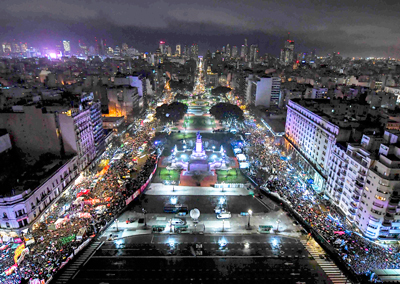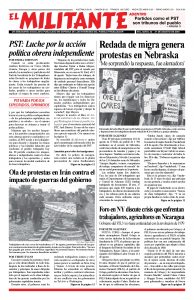After more than 16 hours of debate, with tens of thousands of protesters gathered outside on both sides of the issue, Argentina’s Senate Aug. 9 in a 38-31 vote defeated a bill that would have legalized abortion in the first 14 weeks of pregnancy.

“We don’t see this as a defeat. The majority of people were in favor of passing the law,” Silvia Juliá, executive director of Catholics for Choice, part of the National Campaign for the Right to Safe, Legal and Free Abortion, told the Militant Aug. 13. “All the mobilizations we carried out showed the large support we had. The youth are overwhelmingly for a change.”
Hundreds of thousands had marched in favor of a woman’s right to choose abortion on International Women’s Day March 8. This was the largest pro-choice action in Argentine history. Many wore green scarves (pañuelas), a symbol of the fight.
Founded in 2005, the National Campaign is a coalition of more than 300 organizations, including women’s rights groups, unions and student groups.
In 2015 after the murder of Chiara Paez, a pregnant 14-year-old girl, NiUnaMenos (Not One Woman Less) was formed and organized a demonstration of nearly 200,000 outside Congress protesting violence against women and demanding abortion rights. Thousands more protested across the country.
Under Argentine law, abortion is legal only in cases of rape or risk to a woman’s health or life. Unlike the wealthy or middle-class women, who can afford costly doctors in big cities or outside the country, working-class women and those living in rural areas are forced to turn to “clandestine” abortions. Botched abortions are the leading cause of maternal deaths in Argentina.
Some 97 percent of women in Latin America face similar conditions. Only in Cuba, where workers and peasants made a revolution, and in Uruguay and Mexico City can women freely choose to have an abortion.
The massive mobilizations in Argentina, like the one on March 8, have had a significant impact on the whole region and worldwide. On the day of the vote, demonstrations in support of abortion rights were held in dozens of countries, including Brazil, Chile, Ecuador, Guatemala, Germany and Japan, as well as in Ireland.
Earlier this year more than 66 percent voted by referendum in Ireland to repeal part of their constitution that severely restricted women’s right to abortion.
Countrywide debate
There’s been an ongoing debate throughout Argentina, a largely Catholic country. In mid-April when hearings began on the bill, both women’s rights advocates, including family members of those who had died from botched abortions, and anti-abortion spokespeople testified in live, national TV broadcasts debating the bill.
Pope Francis, who is from Argentina, intervened in the debate, calling abortion the “white glove” equivalent to the Nazi’s eugenics program June 16, two days after the Argentine Lower House voted in favor. He neglected to mention that the fascist regime outlawed both abortion and contraception.
Catholic and evangelical officials campaigned against the bill. Many Catholics, like Silvia Juliá, joined the campaign against the ban on women’s rights.
“We knew there would be a reaction from sections of the Catholic and evangelical churches that were putting on a lot of pressure,” Juliá told the Militant. “We have seen many changes especially in the provinces. Twenty-five years ago few people dared to speak out. Now there is a public debate. We are optimistic we are going to win.”

